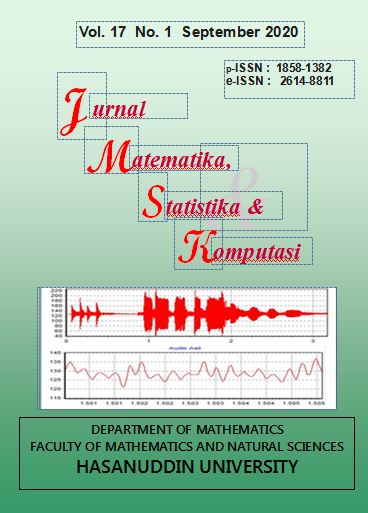Sentiment Analysis of Southeast Asian Games (SEA Games) in Philippines 2019 Based on Opinion of Internet User of Social Media Twitter with K-Nearest Neighbor and Support Vector Machine
DOI:
https://doi.org/10.20956/jmsk.v17i1.9947Keywords:
K-nearest Neighbor, SEA Games, Sentimen, Support Vector MachineAbstract
Sports events are an activity that is in great demand, especially the people of Southeast Asia. One of the most prestigious sporting events in the Southeast Asian region is the Southeast Asian Games (SEA Games). SEA Games is one of the sporting events held in the Southeast Asia region and is only held every two years involving eleven member countries of the Association of South East Asian Nations (ASEAN). The most SEA Games issues occurred on Twitter with 20,600 tweets. This is because the 2019 SEA Games event in the Philippines experienced many irregularities, one of which is the Rizal Memorium stadium, which has not been renovated until now. The purpose of this study is to obtain and compare the results of the accuracy of the classification of Twitter users' sentiments towards the 2019 SEA Games in the Philippines using k-nearest neighbor and support vector machine. The data used in this study comes from data from Twitter social media users who often use the hashtag "SEA Games 2019" which has been done with text preprocessing of 2697 tweets with data partitions of 60% for training data and 40% for testing data. The conclusion that can be drawn from this research is that the best accuracy results in the k-nearest neighbor and support vector machine classification are the support vector machine classification with a polynomial kernel of 92.96% so that the predictions of the Support Vector Machine classification tend to be negative.
References
Latimbang, F. I., 2017. Studi Kelayakan Sarana Prasarana Penunjang Pembinaan Olahraga Prestasi di Pusat Pendidikan dan Latihan Olahraga Pelajar (PPLP) Provinsi Gorontalo. Universitas Negeri Gorontalo, Gorontalo.
Isna, Y., 2015. Sea Games Ajang Pemersatu Asia Tenggara. http://www.kompasiana.com. [1 Desember 2019]
Tsalis, A., 2019. Terungkap Sosok Penyebab Kebobrokan Penyelenggaraan SEA Games 2019 Filipina. http://www.SportFEAT.com. [1 Desember 2019]
Arifin, Y., 2019. #SEAGames2019fail, Netizen Kritik Penyelenggaraan yang Kacau. http://sport.detik.com. [1 Desember 2019]
Twitter., 2020. Pusat Bantuan. http://help.twitter.com. [23 Maret 2020]
Romadloni, N. T., Santoso, I., & Budilaksono, S., 2019. Perbandingan Metode Naïve Bayes, KNN dan Decision Tree Terhadap Analisis Sentimen Transportasi KRL. Jurnal IKRA-ITH Informatika, Vol 3, No. 2, 1-9.
Salam, A., Zeniarja, J., Septiyan, R., Khasanah, U., 2018. Analisis Sentimen Data Komentar Sosial Media Facebook dengan K-nearest Neighbor (Studi Kasus pada Akun Jasa). SINTAK 2018, 480-486.
Pratama, A., Wihandika, R. C., & Ratnawati, D. E., 2018. Implementasi Algoritma Support Vector Machine (SVM) untuk Prediksi Ketepatan Waktu Kelulusan Mahasiswa. Jurnal Pengembangan Teknologi Informasi dan Ilmu Komputer, Vol 2, No. 4, 1704-1708.
Sari, R., 2020. Analisis Sentimen pada Review Objek Wisata Dunia Fantasi Menggunakan Algoritma K-nearest Neighbor (K-NN). Evolusi : Jurnal Sains dan Manajemen, Vol 8, No. 1, 10-17.
Rofiqoh, U., Perdana, R. S., & Fauzi, M. A., 2017. Analisis Sentimen Tingkat Kepuasan Pengguna Penyedia Layanan Telekomunikasi Seluler Indonesia pada Twitter dengan Metode Support Vector Machine dan Lexicon Based Features. Jurnal Pengembangan Teknologi Informasi dan Ilmu Komputer, 1725-1732.
Indriati., Ridok, A., 2016. Sentiment Analysis for Review Mobile Applications using Neighbor Method Weighted K-nearest Neighbor. Journal of Enviromental Engineering & Sustainable Technology, Vol 3, No. 1, 23-32.
Luqyana, W. A., 2018. Analisis Sentimen Cyberbullying pada Komentar Instagram dengan Metode Klasifikasi Support Vector Machine. Jurusan Teknik Informatika, Fakultas Ilmu Komputer, Universitas Brawijaya, Malang.
Latifah, E. F., 2018. Perbandingan Kinerja Machine Learning Berbasis Algoritma Support Vector Machine dan Naïve Bayes. Universitas Islam Indonesia, Yogyakarta.
Riany, J., Fajar, M., & Lukman, M. P., 2016. Penerapan Deep Learning Analysis pada Angket Penilaian Terbuka Menggunakan K-nearest Neighbor. Jurnal Sisfo 6, 147-156.
Buntoro, G. A., 2017. Analisis Sentimen Calon Gubernur DKI Jakarta Tahun 2017 di Twitter. Integer Journal Maret, Vol 1, No. 1, 32-41.
Yunita, N., 2016. Analisis Sentimen Berita Artis dengan Menggunakan Algoritma Support Vector Machine dan Particle Swarm Optimization. J. Sist. Inf. STMIK Antar Bangsa, Vol V, No. 2, 104-112.
Tiara., Sabariah, M. K., & Effendy, V., 2015. Sentiment Analysis on Twitter using The Combination of Lexicon-Based and Support Vector Machine for Assessing The Performance of a Television Program. 2015 3rd International Conference on Information and Communication Technology (ICoICT 2015), 386-390.
Rachimawan, A. F., & Utama, B. S., 2016. Ads Filtering Menggunakan Jaringan Syaraf Tiruan Perceptron. Naïve Bayes Classifier, dan Regresi Logistik. Jurnal Sains dan Seni ITS, Vol 5, No 1, 83-89.
Haryanto, D. J, Muflikhah, L., & Fauzi, M. A., 2018. Analisis Sentimen Review Barang Berbahasa Indonesia dengan Metode Support Vector Machine dan Query Expansion. Jurnal Pengembangan Teknologi Informasi dan Ilmu Komputer, Vol 2, No. 9, 2909-2916.
Downloads
Published
How to Cite
Issue
Section
License

This work is licensed under a Creative Commons Attribution 4.0 International License.
Jurnal Matematika, Statistika dan Komputasi is an Open Access journal, all articles are distributed under the terms of the Creative Commons Attribution License, allowing third parties to copy and redistribute the material in any medium or format, transform, and build upon the material, provided the original work is properly cited and states its license. This license allows authors and readers to use all articles, data sets, graphics and appendices in data mining applications, search engines, web sites, blogs and other platforms by providing appropriate reference.







